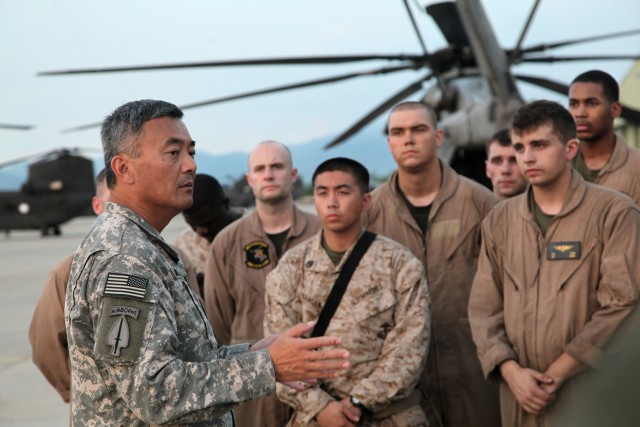
WASHINGTON (Army News Service, Aug. 13, 2010) -- Army aviators are continuing to provide relief to flood victims in Pakistan, even as they await the arrival of their Marine Corps and Navy replacements.
Brig. Gen. Michael Nagata, deputy commander, Office of the Defense Representative, Pakistan, is coordinating U.S. military flood relief efforts from an airbase in Ghazi in the northern Khyber-Pakhtunkhwa province of Pakistan.
"We have been delivering hundreds of thousands of pounds of relief supplies and recovering thousands of stranded personnel from this very large river valley, that because of infrastructure damage, bridge destruction, road erosion, etc., many, many people are in need," the general said. "And we have delivered, just with our military assets, more than 160 metric tons of supplies into the Swat Valley."
The general also said the Army has recovered more than 3,000 individuals stranded by the flood waters since beginning operations in the country -- though, he added, that is just a fraction of what Pakistani forces have done.
Record monsoon rains in July are responsible for the flooding in Pakistan -- with the most heavily affected areas being in the northern Khyber-Pakhtunkhwa province. A U.N. report puts the death toll in the country at 1,200, with at least 2 million being left homeless.
The general said military efforts to provide aid to the Pakistani people included so far almost 500,000 rations that have been distributed. Additionally, the military is providing aviation support. For the Army, that includes four CH-47 Chinook helicopters, and two UH-60 Black Hawk helicopters. Those aircraft are conducting cargo delivery and personnel recovery.
The Department of Defense has authorized 19 new aircraft to replace those six currently in Pakistan. Those aircraft include 12 CH-46 Sea Knight helicopters, four CH-53E Super Stallion helicopters, and three MH-53E Sea Dragon helicopters. During a State Department briefing Aug. 12, it was briefed that the U.S. government has so far pledged more than $70 million in assistance in the region.
"The first element of Marine aviation landed here at Ghazi Air Base yesterday," said Nagata. "It's going to take us a few days to get the entire compliment in here. Meanwhile, the Army element that has been here now for almost two weeks continues to operate. Our goal is to make this transition from Army aviation to Marine aviation as seamless and as transparent as possible to the Pakistani partners that we have been working with."
Nagata said he expects the focus of the Marine element will be the same as the Army focus: providing relief to Pakistanis in the Swat River Valley. He said he expects U.S. military presence in the region to continue as long as it is desired by the Pakistani government.
"We will be here so long as the government of Pakistan requests and requires our assistance," he said. "Everything we do, both the locations we operate from, the access we are given to fly, the landing zones that are designated for our support operations -- all these things are requested, provided by, designated by the appropriate authorities here in the military and the government of Pakistan."
Challenges in Pakistan now include continuing bad weather, Nagata said, which have reduced flying days for American pilots by as much as 50 percent. Also, he said waterborne disease remains a challenge for Pakistanis -- though U.S. military personnel have remained unaffected by those same illnesses.
What's not been a problem for the Army during relief operations in Pakistan are security threats from the Taliban, Nagata said.
"The Pakistani military, ever since we stood up this task force, have done simply an incredibly energetic job and totally committed job at providing multiple layers of security around our activities both in the air and on the ground," he said. "Frankly we have seen no evidence of a threat so far -- we are not looking for it."
The biggest challenge, Nagata said, is facing what nature has wrought on Pakistan.
"The magnitude of this disaster is beyond anything I think anyone was prepared for, not just in Pakistan, but around the world," he said. "The challenge is to rise to the level of the damage and distress that this flood has inflicted."

Social Sharing